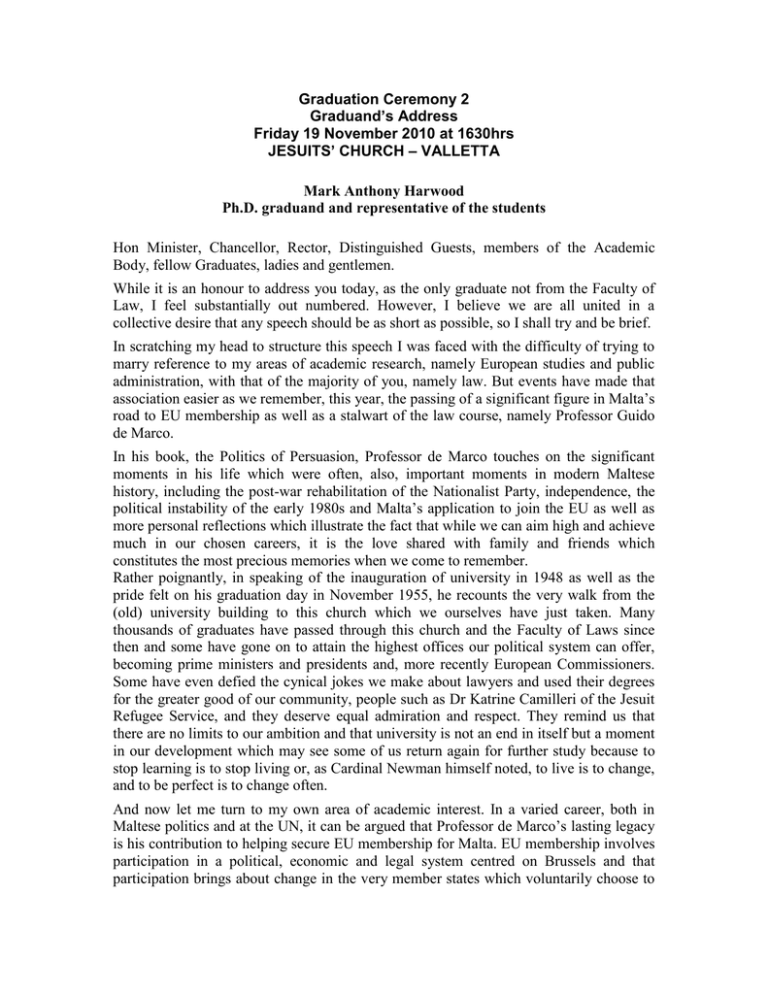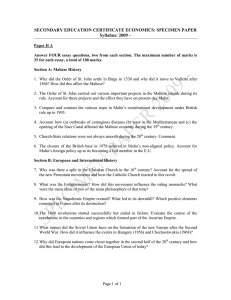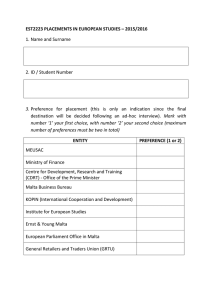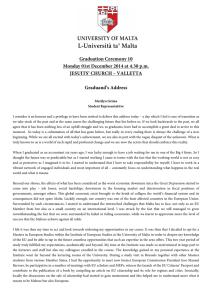Graduation Ceremony 2 Graduand’s Address Friday 19 November 2010 at 1630hrs
advertisement

Graduation Ceremony 2 Graduand’s Address Friday 19 November 2010 at 1630hrs JESUITS’ CHURCH – VALLETTA Mark Anthony Harwood Ph.D. graduand and representative of the students Hon Minister, Chancellor, Rector, Distinguished Guests, members of the Academic Body, fellow Graduates, ladies and gentlemen. While it is an honour to address you today, as the only graduate not from the Faculty of Law, I feel substantially out numbered. However, I believe we are all united in a collective desire that any speech should be as short as possible, so I shall try and be brief. In scratching my head to structure this speech I was faced with the difficulty of trying to marry reference to my areas of academic research, namely European studies and public administration, with that of the majority of you, namely law. But events have made that association easier as we remember, this year, the passing of a significant figure in Malta’s road to EU membership as well as a stalwart of the law course, namely Professor Guido de Marco. In his book, the Politics of Persuasion, Professor de Marco touches on the significant moments in his life which were often, also, important moments in modern Maltese history, including the post-war rehabilitation of the Nationalist Party, independence, the political instability of the early 1980s and Malta’s application to join the EU as well as more personal reflections which illustrate the fact that while we can aim high and achieve much in our chosen careers, it is the love shared with family and friends which constitutes the most precious memories when we come to remember. Rather poignantly, in speaking of the inauguration of university in 1948 as well as the pride felt on his graduation day in November 1955, he recounts the very walk from the (old) university building to this church which we ourselves have just taken. Many thousands of graduates have passed through this church and the Faculty of Laws since then and some have gone on to attain the highest offices our political system can offer, becoming prime ministers and presidents and, more recently European Commissioners. Some have even defied the cynical jokes we make about lawyers and used their degrees for the greater good of our community, people such as Dr Katrine Camilleri of the Jesuit Refugee Service, and they deserve equal admiration and respect. They remind us that there are no limits to our ambition and that university is not an end in itself but a moment in our development which may see some of us return again for further study because to stop learning is to stop living or, as Cardinal Newman himself noted, to live is to change, and to be perfect is to change often. And now let me turn to my own area of academic interest. In a varied career, both in Maltese politics and at the UN, it can be argued that Professor de Marco’s lasting legacy is his contribution to helping secure EU membership for Malta. EU membership involves participation in a political, economic and legal system centred on Brussels and that participation brings about change in the very member states which voluntarily choose to join the Union. This domestic change process related to EU membership is often labelled Europeanization. In my doctoral research I undertook an analysis of how membership has changed the Maltese public administration, in particular its structures, the role of actors and the types of policy dealt with by the Maltese government. My research showed that EU membership has been used to further centralise Maltese decision making, making us, as the British deputy Prime Minister, Nick Clegg, said some months ago, the most highly centralised state in the EU. That statement led to a chorus of disapproval but, I suspect, not because it was false but because it touched upon the truth too closely. That centralisation has created a super ministry at the heart of Malta’s political system, namely the Office of the Prime Minister and given it powers of patronage that it has rarely had, primarily through the PPCD. In addition to creating structural changes, membership has impacted the range of policy dealt with by government, seen a greater regulatory emphasis in policy output and increased the scope of non-governmental actors to influence policy implementation through their access to EU actors which now monitor the domestic implementation of EU law. But what of the public service? As highlighted by Professor de Marco in his book, political parties have often viewed public servants with mistrust. In the aftermath of the elections of 1987 Guido de Marco even provides the number of police officers, ‘not more than 100’, with Nationalists sympathies, leaving 900 whose loyalties lay elsewhere. That distrust of public servants with opposing political views is compounded by the long periods in office enjoyed by both political parties since independence with the result that a sizeable intake and numerous senior appointments are made within the public service during a single government’s term in office. EU membership has placed a heavy burden on the Maltese public administration, both the political elite calling the shots and more especially the public servants implementing their decisions. In reacting to Commission proposals, in participating in comitology meetings, in attending Council working groups, in ensuring the transposition of directives, in providing feedback to Commission auditors and technical missions, in answering the queries of a warren of EU institutions and agencies, much of this burden is borne by public servants, often over worked, under paid and under appreciated. This is an unfortunate consequence of membership. As stated by one senior official I interviewed, membership has meant greater involvement for the public service in politics but no greater power, no definable benefit. Other actors who knew what they wanted used the flux created around membership to gather power around them. In this way, the OPM, and to a lesser extent, Finance, gained more responsibility after 2004 while several individuals became empowered through their coordination role in EU affairs, helped in no small part by the logic of the argument that it is better to have a highly centralised system for the coordination of EU affairs to off-set the country’s administrative limitations. The fact that the public service gained a burden and no real power reflects badly on the public service and may reflect a fragmentary nature which is no longer able to articulate a collective interest or one which has become overwhelmed by its subordinate status in its dealings with political elites. Malta needs a more unified public service, unified in objectives and collective identity. It must better use the constructive office of our university’s academics in this area, especially the Institute for Public Administration and Management, to help consolidate that service. Too much of our coordination system for EU affairs relies on actors who will leave when government changes and the EU is too complex a political system to reconstruct coordination systems every time government changes. For Malta’s long term success in the EU we need more mature government where the political parties draw a line under partisanship in the organisational structures overseeing EU affairs and the public service must place itself in a position where it can provide continuity in those organisational structures through a greater sense of self. In concluding I am reminded of two important lessons which can be drawn from Guido de Marco’s reflections on Malta’s road to EU membership. Firstly, in outlining our difficult road to membership he indicates that Malta’s quest was made easier with the help of Malta’s friends, primarily the UK and Italy. All difficult journeys are made more bearable by not having to travel alone and we must thank those of you here today who love and support us. I have lost count of the dissertations I have corrected which thank the family pet, the aunts and uncles, the brothers and sisters and most especially parents and partners who endure panic attacks and moody silences during the years of study. This day is as much yours as it is ours and we thank you for not divorcing us (Parliament permitting) or disowning us. Secondly, I am reminded of his appraisal of the journey to membership which he said was about ‘perseverance, insistence and consistency’. I sometimes believe that the greatest achievement on graduation day is that one has persevered, been consistent, insisted, often with oneself, not to give up. For most of us, today is the culmination of many years of study. We will have lost loved ones, endured heartache, seen friends come and go, endured moments of self doubt as well as wasted countless hours circling the university ring road looking for a parking space. But we endured, we persevered and stand here ready to graduate and that is an achievement in itself. Malta has changed significantly since 2004. This shows that membership was not an end in itself just as this graduation day is not an end to our lives as students but merely a moment in our individual journeys. I wish to conclude with the final words from another political memoir published recently, that of the former British Prime Minister, Tony Blair. On leaving office he said ‘I felt there was unfinished business; but then I consoled myself with the thought that the business is never finished ... I have come a long way on the journey, but I am painfully aware I have much further to go ... There is so much frailty still to overcome, but in overcoming it lies the meaning of life’. I wish you all fruitful, happy and long journeys.



